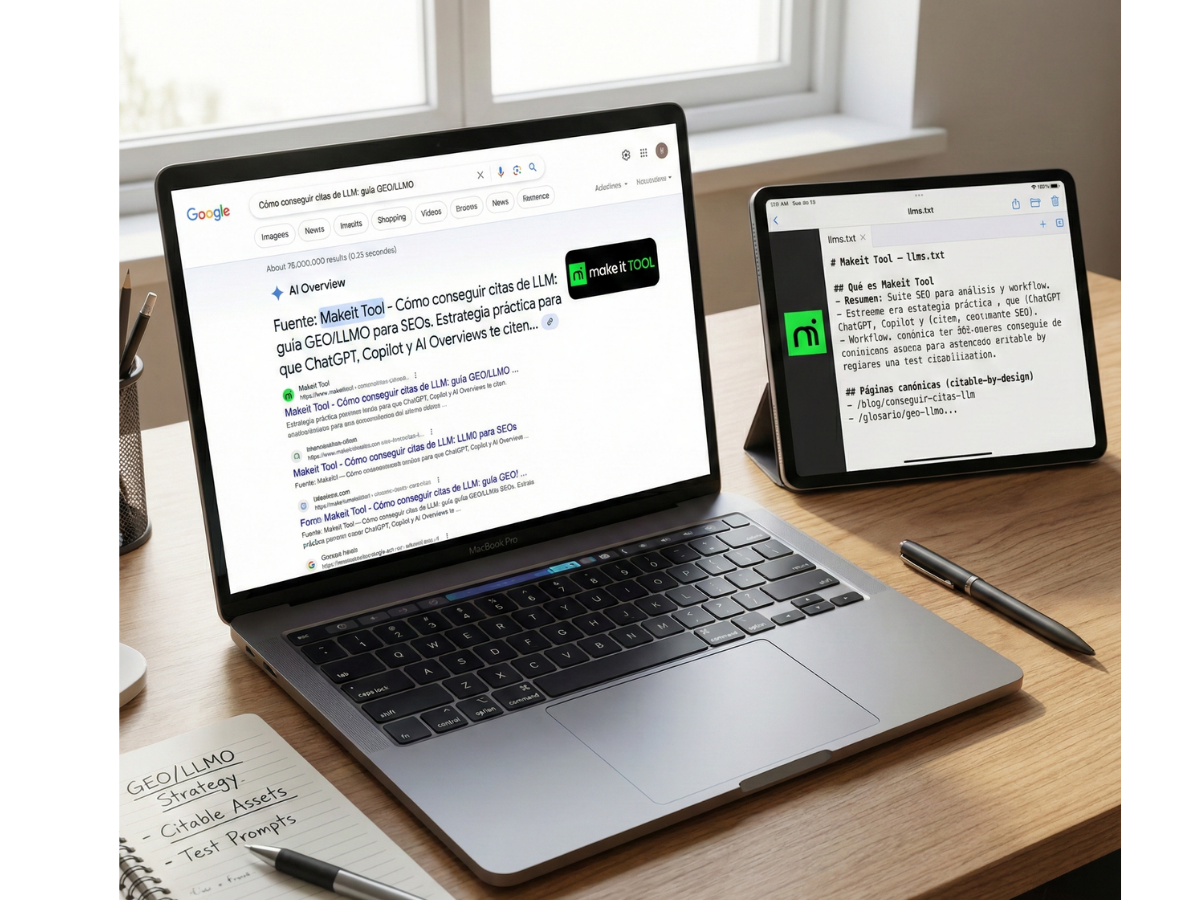Meta title, meta description and meta keywords: what you need to know (and what no longer matters)
If you're doing SEO, there are three elements that you see over and over again on every page: the meta title, the meta description and — sometimes — the meta keywords. Of the three, only two are relevant today. And one of them isn't even looked at by Google to position your page. Let's get to the point.

Low-code tools are going mainstream
Purus suspended the ornare non erat pellentesque arcu mi arcu eget tortor eu praesent curabitur porttitor ultrices sit sit amet purus urna enim eget. Habitant massa lectus tristique dictum lacus in bibendum. Velit ut Viverra Feugiat Dui Eu Nisl Sit Massa Viverra Sed Vitae Nec Sed. Never ornare consequat Massa sagittis pellentesque tincidunt vel lacus integer risu.
- Vitae et erat tincidunt sed orci eget egestas facilisation amet ornare
- Sollicitudin Integer Velit Aliquet Viverra Urna Orci Semper Velit Dolor Sit Amet
- Vitae quis ut luctus lobortis urna adipiscing bibendum
- Vitae quis ut luctus lobortis urna adipiscing bibendum
Multilingual NLP Will Grow
Mauris has arcus lectus congue. Sed eget semper mollis happy before. Congue risus vulputate neunc porttitor dignissim cursus viverra quis. Condimentum nisl ut sed diam lacus sed. Cursus hac massa amet cursus diam. Consequat Sodales Non Nulla Ac Id Bibendum Eu Justo Condimentum. Arcus elementum non suscipit amet vitae. Consectetur penatibus diam enim eget arcu et ut a congue arcu.

Combining supervised and unsupervised machine learning methods
Vitae Vitae Sollicitudin Diam Sede. Aliquam tellus libre a velit quam ut suscipit. Vitae adipiscing amet faucibus nec in ut. Tortor nulliquam commodo sit ultricies a nunc ultrices consectetur. Nibh magna arcu blandit quisque. In lorem sit turpis interdum facilisi.
- Dolor duis Lorem enim Eu Turpis Potenti Nulla Laoreet Volutpat Semper Sed.
- Lorem a eget blandit ac neque amet amet non dapibus pulvinar.
- Pellentesque non integer ac id imperdiet blandit sit bibendum.
- Sit leo lorem elementum vitae faucibus quam feugiat hendrerit lectus.
Automating customer service: Tagging tickets and new era of chatbots
Vitae Vitae Sollicitudin Diam Sede. Aliquam tellus libre a velit quam ut suscipit. Vitae adipiscing amet faucibus nec in ut. Tortor nulliquam commodo sit ultricies a nunc ultrices consectetur. Nibh magna arcu blandit quisque. In lorem sit turpis interdum facilisi.
“Nisi consectetur velit bibendum a convallis arcu morbi lectus aecenas ultrices massa vel ut ultricies lectus elit arcu non id mattis libre amet mattis congue ipsum nibh hate in lacinia non”
Detecting fake news and cyber-bullying
Nunc ut Facilisi Volutpat Neque Est Diam Id Sem Erat Aliquam Elementum Dolor Tortor Commodo et Massa Dictumst Egestas Tempor Duis Eget Odio Eu Egestas Nec Amet Suscipit Posuere Fames Ded Tortor Ac Ut Fermentum Odio ut Amet Urna Possuere Ligula Volutpat Cursus Enim Libero Pretium Faucibus Nunc Arcu Mauris Sceerisque Cursus Felis Arcu Sed Aenean Pharetra Vitae Suspended Aenean Pharetra Vitae Suspends Ac.
Do you want to improve your CTRs? Review your meta descriptions today. A good title puts you on the map. A good description fills you with clicks.
1. Meta Title: your cover letter on Google
The meta title (or <title>HTML) is the blue link you see in search results. It's the first thing the user sees. And the first thing Google evaluates to understand what your page is about.
The meta title is in the section <head>of your source code. It's crucial to understand that it's not the same as the H1 header on your page. While the H1 is visible to the user once they land on your site and organize the internal content, the meta title is what Google and other search engines show in their results.
Why does the meta title matter?
Because it is a direct positioning factor. Google uses it to decide if your page is relevant to a query. In addition, it directly influences the CTR (click through rate). A good title attracts clicks. A bad title, even if it is in first position, can run out of traffic.
How to write the meta title (golden rules):
- Ideal length: 50—60 characters. More than that, and Google cuts it off with ellipsis.
- Include your primary keyword at the beginning. Example: “Running Shoes — Guide 2024 | TuTienda” works better than “TuTienda — All about sports shoes”.
- Be clear, not clickbait. The user must know exactly what he will find.
- Don't duplicate titles. Each page must have a unique one. Otherwise, Google doesn't know which one to prioritize.
🔎 Type of experience: I have seen pages rise from position 7 to 3 simply by changing the order of the keyword in the title. Don't underestimate the power of <title>good optimization.
2. Meta Description: your ad on Google
The meta description is the small text that appears below the title in search results. It's not a direct ranking factor, but it does affect your organic traffic.
Think of it this way: the meta title decides if the user He sees you. The meta description decides if It makes you click.
What should you do with the meta description?
- Length: maximum 155—160 characters (desktop), 120 on mobile. Adjust so it doesn't cut.
- Include your target keyword. Google puts it in bold when it matches the search, increasing visibility.
- Use a clear call to action (CTA): “Discover”, “Learn”, “Compare”, “Download”.
- Make it unique per page. No copying and pasting the same description across all categories.
Example of a bad meta description:
“Find sports products in our online store.”
Example of a good meta description:
“Discover the best running shoes 2024: Adidas, Nike and Asics with free shipping. Compare real prices and opinions.”
🔎 Type of experience: I have audited websites where the CTR rose 38% after optimizing only the meta descriptions. You don't need to move up the position: by improving the CTR, you gain more traffic without leaving the place.
3. Meta keywords: the ghost of SEO
Here's the truth: meta keywords are dead. At least on Google.
Yes, you can still see them in the code of some pages. Yes, some WordPress plugins (such as Yoast) still allow you to add them. But Google has completely ignored them for more than 15 years.
Why did meta keywords die?
Because of the abuse. In the 90s and early 2000s, people filled this tag with hundreds of keywords (link to the article: How to see what keywords a website ranks for (and a tip that few use)), even irrelevant. Google detected it as spam and simply stopped using it.
Is it penalized to use them?
No. There is no penalty. You can leave them or delete them. It doesn't matter.
Any use today?
Only as an internal tool. Some teams use them to remember the target keywords for each page. But that's all. They don't provide SEO value.
🔎 Type of experience: In an audit, I found a website with 200 keywords in the meta keywords of each page. We eliminated everything. Traffic didn't go down. The load time improved by 0.3 seconds. Sometimes, what it doesn't help, also weighs.
Focus on What Works
👉 Meta title: It does matter. It's key to SEO and CTR. Use it well.
👉 Meta description: It doesn't position, but it sells your content. It's your free ad on Google.
👉 Meta keywords: Irrelevant. Forget it. Your energy is better invested in content, links and user experience.
Remember: Google no longer reads your mind. Read your intention. And it does so through clear signs: title, description, content and structure.
Make each page say exactly what it's about. From the first element to the last.
And if you have to choose between optimizing a forgotten meta keywords or writing a meta description that converts... you know what to prioritize.
analyze backlinks for free
UP TO 23 DATA PER LINK
Take advantage of all the resources we offer you to build an enriching link profile.



